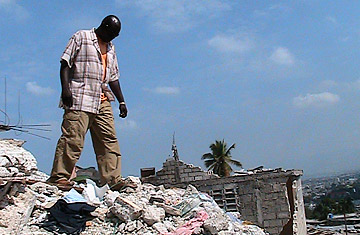
Lonez Annoule searches for his 6-year-old daughter Lodz, who has been missing since the 7.0 earthquake devastated Haiti
Lonez Annoule's search for his 6-year-old daughter Lodz began minutes after the 7.0-magnitude earthquake in Haiti. He was about to prepare to send the little girl, an American citizen, back home to Miami when catastrophe struck. Annoule was on his way back from his trip to sell used clothing in the southwestern city of Petit-Goâve. His bus came to a halt because piles of dead bodies were blocking the road. "When I saw those bodies, I only thought of one thing — my daughter," says Annoule, 37. "I walked all night, nonstop, from 5:30 in the evening to 10 a.m., to reach her."
Annoule covered about 35 miles in the darkness, with long spreads of silence and bursts of cries for help. As he approached his sister-in-law's house in the Port-au-Prince district of Carrefour Feuilles, each block no longer resembled what he remembered. And the four-story apartment building where he had left his daughter was flattened. "When I got to the house, I saw my sister-in law with her arms stretched out, and I knew," says Annoule, fixing his eyes on the ground.
He hired neighborhood men to pull concrete blocks with their bare hands, looking for any sign of Lodz. They worked for two straight weeks. The search for the little girl was then turned over to the U.S. military's mortuary affairs, a unit that began looking for the remains of American victims of the quake in the beginning of March. The team has since recovered the remains of 52 Americans, but not Lodz's. This week, about 2½ months after the quake, it gave up.
Michael Looney, the head of the mortuary-affairs investigative unit in Haiti, says the site has become too dangerous to continue excavation and poses increasing risk to his crew and to fragile homes in the surrounding area. His team is now returning to the U.S. "The success was so great," says Looney of the bodies they recovered. At one of the major recovery sites, the Hotel Montana, in the upper-class area of Pétionville, Looney's team recovered the remains of 17 Americans, including students from Lynn University.
Recovery after two months of decomposition means many of the cadavers were skeletal, requiring tests to ensure correct identification. "The identification really starts on the scene," says David Hunt, 40, commander of Haiti DMORT (Disaster Mortuary Operational Response Team). "We had anthropologists, pathologists and DNA testing all on hand." Bodies were also retrieved with the assistance of the only cadaver dog on the mission, Spirit, a yellow Labrador retriever.
Looney says there was often no way of distinguishing Americans from Haitians, so each body would be dug up at a site. "The number of Haitians far exceeded the number of Americans recovered," says Looney. "We would hand them over to the Port-au-Prince morgue" — a morgue he described as a "hellhole" with hundreds of bodies stacked on top of one another. "They didn't even use rubber gloves to handle the bodies until we gave them some," says Looney. The Americans found the bodies they had turned over to the Haitians lying in the same overcrowded morgue weeks later.
Some estimate that thousands of Haitians still lie underneath the rubble. And while some American families may be leaving with a sense of closure, many Haitian families live without that finality. For Lonez Annoule, closure is more a process than a destination. He says that although he's come to terms with his daughter's death, he remains in disbelief at times. "Everywhere I go, I think I see her," says Annoule. "All I want to do is see her one last time."
Annoule says he is planning a memorial service for his daughter on April 16, which would have been Lodz's seventh birthday. He recalls the frantic efforts to find her weeks ago. Each dust-covered body pulled out, Annoule hoped would be his daughter. "While looking for Lodz, I saved five children but lost mine." Looney thinks of all the countrymen he helped recover and repatriate. "But she was the only one," he says. "It's the only case that's going to haunt me."
